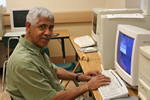Returning to Work

What Do You Need to Know?
 Not everyone is ready to go back to work. Things your loved one did before may now be unsafe.
Not everyone is ready to go back to work. Things your loved one did before may now be unsafe.
- Stroke survivors may feel a great loss if they cannot return to their old jobs.
- Encourage your loved one to be realistic about what they can do. This may improve your loved one’s mindset and lower risk for injuries at work.
- Follow the healthcare team’s advice about when it is safe to go back to work.
- Your support is key to your loved one’s return to work.
What are the benefits of returning to work?
- Work often makes one feel like an important member of society.
- Work adds to a sense of life satisfaction.
- Mood and energy levels are often raised.
- Health and memory may improve.
How can you find help?
If your loved one cannot return to the same job, there are options. 
- The National Resource Directory has resources on jobs in the area, education, and transportation. Find information to help persons with disabilities modify their vehicles.
- Unions protect employees from unfair treatment and are a good resource.
- Vocational rehab agencies provide counseling on returning to work.
Helpful Tips
- Good relationships with the employer and co-workers can make life easier.
- Your loved one does not need to tell others about the stroke. Sharing with others may make them feel good. Others can be alert to symptoms of stroke and told to call 9-1-1 if needed.
- Fair accommodations may need to be made in the workplace. Employers must make these changes.
- Title I of the Americans with Disabilities Act (ADA) protects employees with disabilities.
- If your loved one faces discrimination, contact the U.S. Equal Employment Opportunity Commission within 180 days of the incident.
What to know if your loved one cannot return to work
- There are options if your loved one cannot return to work.
- People often attach their self-worth to their jobs.
- With your support, your loved can learn new things and feel fulfilled.
- Volunteering, hobbies, and joining clubs in the community can help in feeling connected.
Remember
- Make sure your Veteran is ready and safe to return to work.
- There are many resources to help with their return to work.
- Being supportive of your Veteran is important.
- If your loved one cannot return to work, suggest other activities.
More Resources 
Additional credible resources on this topic can be found here. Website pages may change or update, therefore if a link does not work, you may also try to type the information into your internet search bar. This Resource List will be updated frequently.
|
*Link Disclaimer: Links to information and Web sites outside of the Department of Veterans Affairs do not indicate an endorsement of products or services offered by the sites. In addition, these sites may have privacy and security policies that are inconsistent with those of VA. |
References: Alaszewski, A., Alaszewski, H., Potter, J., & Penhale, B. (2007). Working after a stroke: Survivors experiences and perceptions of barriers to and facilitators of the return to paid employment. Disability and Rehabilitation, 29(24), 1858–1869. doi: 10.1080/09638280601143356; Daniel, K., Wolfe, C. D., Busch, M. A., & Mckevitt, C. (2009). What Are the Social Consequences of Stroke for Working-Aged Adults? Stroke, 40(6). doi: 10.1161/strokeaha.108.534487; Harris, C. (2014). Return to Work After Stroke. Stroke, 45(9). doi: 10.1161/strokeaha.114.006205; Hoffman, H. (2017, June 29). Going Back to Work After a Stroke: What You Need to Know. Retrieved from https://www.saebo.com/blog/going-back-work-stroke-need-know/; Vestling, M., Tufvesson, B., & Iwarsson, S. (2003). Indicators For Return To Work After Stroke And The Importance Of Work For Subjective Well-Being And Life Satisfaction. Journal of Rehabilitation Medicine, 35(3), 127–131. doi: 10.1080/16501970310010475
These materials were created for the project:
Web-Based Informational Materials for Caregivers of Veterans Post-Stroke
Project Number SDP 06-327 funded by VA HSR&D Quality Enhancement Research Initiative (QUERI)



















